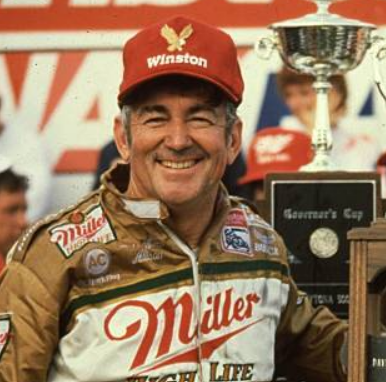Bobby Allison’s recognition as the winner of the 1971 race at Bowman Gray Stadium marks a significant milestone for NASCAR and its community
It reinforces the idea that the sport values its history and is willing to correct past oversights. This decision honors a legendary driver while also reflecting a commitment to integrity and fairness in the sport.
As fans continue to react and engage with this announcement, the legacy of Bobby Allison will undoubtedly be celebrated in new ways, inspiring both current and future generations of NASCAR fans and drivers alike.
The road ahead for NASCAR is filled with possibilities, and recognizing the contributions of its legends is a crucial part of that journey.
The controversy surrounding Bobby Allison’s victory at the 1971 Myers Brothers Memorial 250 serves as a reminder of the complexities inherent in the world of auto racing.
NASCAR’s rules and regulations have evolved over the years, but the lessons learned from this incident continue to resonate with fans and drivers alike.
As NASCAR continues to grow and adapt to the ever-changing landscape of motorsports, the sport remains committed to ensuring that fairness and integrity are at the forefront of competition.
The memory of the 1971 race, and the discussions it sparked, remains an important part of NASCAR’s history, reminding everyone involved in the sport of the challenges and triumphs that come with racing.
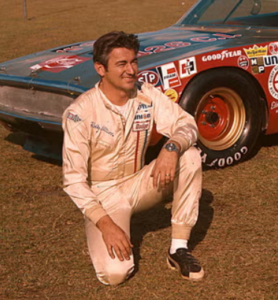
Also Read: William Byron (Racing): Bio, Wiki, Age, Career, Awards, Net Worth 2024 and More
Table of Contents
Bobby Allison: Long-Awaited Recognition
The 85th Career Win
The world of NASCAR is often steeped in history, filled with dramatic races, fierce competition, and passionate fans.1
Recently, the sport revisited a significant chapter from the past, concluding a 53-year-long controversy surrounding Bobby Allison’s 85th career win at Bowman Gray Stadium on August 6, 1971.
With this official recognition, NASCAR not only honors a legendary driver but also reaffirms its commitment to rectifying past oversights.
Bobby Allison has won 84 Cup Series races, placing him in fourth place on the all-time wins list.
— Bobby Allison Film (@allisonfilm) April 22, 2013
The Historic Race at Bowman Gray
Bowman Gray Stadium, known for its tight corners and short track, has been a historic venue for NASCAR racing.
The race on that fateful day in August 1971 was pivotal, not only for the participants but for the sport itself. Bobby Allison, driving a Grand American car, crossed the finish line first, marking his 25th career Cup victory.
However, controversy soon overshadowed this achievement due to post-race inspections that led to a cloud of uncertainty regarding the legitimacy of his win.
For decades, the question remained: Was Allison’s victory legitimate? Many fans, analysts, and fellow competitors debated this issue, as NASCAR’s regulations evolved, and the importance of post-race inspections became increasingly pronounced.
Despite the scrutiny, Allison’s legacy within NASCAR remained intact, although his official win tally was marred by this historical footnote.
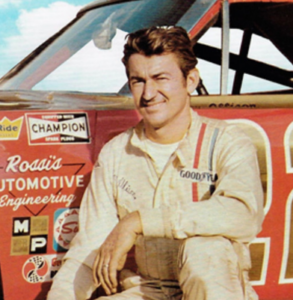
Bobby Allison: NASCAR’s Official Announcement
On a momentous day for both Bobby Allison and the NASCAR community, NASCAR CEO Jim France and Vice Chairman Mike Helton personally delivered the news to the now 86-year-old Hall of Famer.2
This heartfelt recognition not only grants Allison the credit he deserved but also elevates him to fourth place on the all-time wins list in the NASCAR Cup Series.
NASCAR’s official statement reaffirmed this decision, stating, “Today, NASCAR announces its recognition of Bobby Allison as the official winner of the 1971 NASCAR Cup Series race at Bowman Gray Stadium.
Allison, who drove a Grand American car to victory that day, now counts this win toward his NASCAR Cup total, bringing him to 85 career wins.”
This announcement is not just about numbers; it symbolizes a rectification of a long-standing injustice in the sport, one that reflects NASCAR’s evolving understanding of its history and the importance of honoring its legends.
Fan Reactions: A Mixed Bag of Emotions
- As with any significant announcement in the world of sports, fan reactions varied widely. Some fans expressed enthusiasm and joy over the news, celebrating the correction of a historical wrong.
- One fan remarked, “This is fantastic news. Finally, a wrong has been righted. Thankfully it has been done while Bobby can know about it.”
- However, the announcement also elicited skepticism and pointed questions.
- One fan raised concerns about the implications of post-race inspections, asking, “Did he pass post-race inspection?” This sentiment reflects a broader debate within the NASCAR community regarding the fairness and consistency of enforcement across different eras.
- Moreover, some comments showcased a deeper frustration with the current state of NASCAR, with one fan cynically questioning whether it would take another 53 years to address the perceived issues with the playoffs and performance rewards in modern racing.
- This highlights the ongoing discussions surrounding the sport’s evolution and the challenges it faces in maintaining its integrity and connection to its roots.
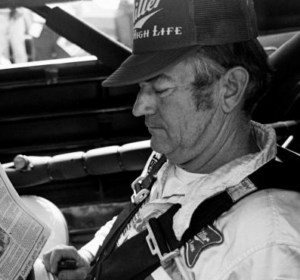
Bobby Allison: Who Is He?
A NASCAR Legend
- Bobby Allison’s impact on NASCAR extends far beyond his wins and accolades.3
- Racing in the NASCAR Cup Series from 1961 to 1988, he became a foundational figure in the sport, known for his fierce competitiveness and camaraderie with fellow drivers.
- As a founding member of the Alabama Gang, a legendary group of drivers from Hueytown, Alabama, Allison’s influence permeated the sport and inspired countless future generations of racers.
- Throughout his illustrious career, Allison won the 1983 Winston Cup Championship, solidifying his place among NASCAR’s elite.
- His three Daytona 500 victories further cemented his legacy, showcasing his skill and determination on some of the biggest stages in motorsport.
- Even as the controversies swirled around his 1971 win, Allison remained a beloved figure within the racing community, revered for his contributions to the sport and his unwavering passion.
A Step Towards Healing in the NASCAR Community
The decision to recognize Bobby Allison’s 85th win is not merely a nod to one driver; it reflects NASCAR’s commitment to acknowledging its history, addressing past mistakes, and fostering a sense of closure.
For many fans and participants in the sport, this recognition serves as a reminder that the essence of NASCAR is built on respect for its drivers and the stories they carry.
This acknowledgment may also pave the way for a broader examination of NASCAR’s historical records and controversies.
As the sport continues to evolve, it may choose to revisit other moments in its past, ensuring that the narratives surrounding its legends are accurate and respectful.
The Future of NASCAR and Bowman Gray Stadium
Bowman Gray Stadium, which has hosted numerous memorable races, is set to welcome the NASCAR season-opening Clash next year.
This event presents an opportunity for both fans and drivers to honor the sport’s rich history while looking forward to the future.
With the recent acknowledgment of Bobby Allison’s win, the stadium can serve as a symbolic venue where the past meets the present, allowing fans to celebrate both historic achievements and contemporary racing.
As NASCAR prepares for its upcoming season, the recognition of Allison’s victory offers a poignant reminder of the sport’s roots and the drivers who helped shape its identity. The blend of nostalgia and innovation is essential for engaging the next generation of fans while honoring those who paved the way.
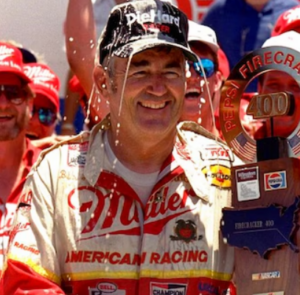
Also Read: NASCAR Legend Jimmie Johnson Joins Forces with Salad Company for a Noble Cause
Bobby Allison: The 1971 Myers Brothers Memorial 250
In the world of NASCAR, controversies have often colored the narratives of races, shaping the legends and legacies of drivers.
One of the most enduring controversies revolves around the 1971 Myers Brothers Memorial 250, where Bobby Allison’s victory remains a topic of discussion even decades later.
This event highlighted the complexities of NASCAR’s rules and regulations during a time of transition in the sport.
The Myers Brothers Memorial 250, held at the Martinsville Speedway in Virginia, was unique because it featured competitors from both the NASCAR Cup Series and the Grand American Series.
This event occurred at a time when the lines between different racing series were often blurred, and the integration of various types of vehicles was becoming more common.
The race was significant not only for its format but also for the drivers involved, including Bobby Allison, a prominent figure in the NASCAR Cup Series during the early 1970s.
The Race Dynamics
During the 1971 Myers Brothers Memorial 250, Bobby Allison drove a Ford Mustang that was not a standard Cup Series machine.
The car’s technical specifications were in line with those permitted in the Grand American Series, but not the Cup Series.
This crucial distinction would ultimately lead to the controversy surrounding the race’s results. Allison led an impressive 138 laps of the 200-lap race, dominating much of the event and showcasing his driving prowess.
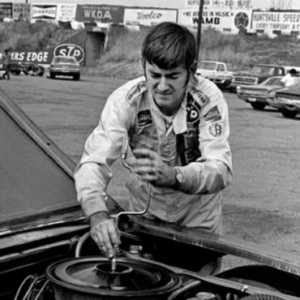
Bobby Allison: The Finish Line Controversy
Upon crossing the finish line, Bobby Allison was initially celebrated as the winner. He was handed the trophy in victory lane, where the crowd applauded and cheered for his impressive performance.
However, the jubilance was short-lived. NASCAR officials soon announced that due to the technicalities surrounding the vehicle classifications, Allison’s win would not be counted toward his official Cup Series total.
This decision sent shockwaves through the racing community and raised questions about the fairness of the ruling.
The Aftermath: NASCAR’s Decision
- NASCAR’s decision to deny Allison the win was primarily based on the rules governing vehicle eligibility for the respective series.
- The governing body emphasized that only vehicles that met the Cup Series specifications could earn points or official wins within that series.
- As a result, even though Allison had outperformed his competitors, his victory did not count in the record books.
- Richard Petty, a legendary driver in his own right and the runner-up in that race, also faced a similar fate.
- Petty was driving a Grand National Plymouth, which meant that neither he nor Allison would receive credit for their finishes in the Cup Series standings.
- This ruling exemplified NASCAR’s strict adherence to its regulations and the implications of driving vehicles that did not conform to the series’ standards.
Comparisons to Other Events
Interestingly, Bobby Allison was not the only driver participating in both the NASCAR Cup Series and the Grand American Series that year.
Other notable names included Dave Marcis, Buck Baker, Jim Paschal, and the late Tiny Lund. While Lund successfully won two Cup Series races that year with a Grand American car, the outcomes of those races did not lead to the same level of scrutiny or controversy as Allison’s performance in the Myers Brothers Memorial 250.
The inconsistency in how different drivers and their vehicles were treated sparked further debates about NASCAR’s rules and the fairness of its enforcement.
Many observers noted the seeming double standard, as some drivers were celebrated for their achievements while others faced consequences for similar situations.
Also Read: Connor Zilisch (NASCAR Star): Update on Condition After Frightening Talladega Crash
